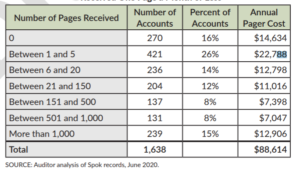Audit shows problems with city pagers
Tuesday, January 19, 2021 by
Jo Clifton According to a report issued by the Office of the City Auditor, the city is not effectively managing many of the 1,600-plus pagers issued to city employees. The result, auditors say, is unnecessary spending and the possibility that the lack of oversight is “impacting the city’s ability to communicate in an emergency.”
The city formed a partnership with regional partners to contract with a vendor for an interagency pager-based communication system in 1999. The city paid $88,614 for the service in 2020. The vendor, Spok Inc., provides a wireless messaging system that allows users to communicate via pager, text, email and a smartphone application. That contract expires in 2022, and auditors said the city needs to review services it is receiving from Spok to decide how best to meet the needs of the city and its regional partners.

Many city employees who have been assigned pagers appear to use them infrequently or do not even know where they are, with 31 percent of them saying either that they did not know the location of the pager or that it was not working. Auditors found that 41 percent of those who have pagers used the device once a month or less.
In addition, the city “does not have a strategic way of knowing if key staff are connected to the system or using their devices, which may result in critical communication lapses.” When auditors spoke with some of the city’s regional partners, they found that they do not typically use the wireless messaging system to communicate with the city.
Two-thirds of employees interviewed about pagers said they could accomplish their work without a pager, but one-third said that they use their pager daily. Auditors said that because the city’s pagers can receive but not send messages, their usefulness as a standalone device is limited.
Auditors also found that the city is still paying for at least 90 active pager accounts for employees who left the city between 2011 and 2019, costing about $13,000.
Auditors also found that many city employees receive more than one communication device from the city. For example, an employee might receive a pager as well as a cell phone. At least three city departments have purchased “systems that include a wireless messaging service and use that for internal communications,” auditors noted.
Twenty-seven of 33 departments auditors analyzed had a Spok account at the beginning of 2020, with 4,389 overall wireless messaging service accounts. Of those, 1,638 used pagers. They noted that pagers are relatively inexpensive, with a $4.50 monthly service charge per user and a replacement cost of $35. Accounts that combined paging services with text messaging and email can cost up to $11.50 a month per user.
Among city departments, the Austin Police Department had the greatest number of wireless messaging user accounts by far, with 2,236 total accounts. However, only 182 of those were pager accounts.
Other departments, including EMS, Communications and Technology Management, and Austin Water, had a few hundred accounts each.
Auditors noted that during critical situations, it is important for staff to be able to coordinate their responses and carry out their operations safely. Pagers have long been considered ideal for communicating with large numbers of people. Unlike cell phones and radios, pagers “have a long battery life and the relatively low cost make them ideal for communicating with large numbers of people,” auditors said. They urged the appropriate staff to actively assess use of pagers in the future.
In their response, Juan Ortiz, director of Homeland Security and Emergency Management, and interim Chief Information Officer Chris Stewart said they agreed with all the recommendations in the audit. “While HSEM and CTM jointly lead the operational and technological management of the overall wireless messaging system, they have counted on the various city departments and offices to ensure that their information is current in the system and that they are being billed appropriately.”
They also promised to expand the existing wireless messaging team and to develop a citywide standard operating procedure for pager management. Members of the City Council Audit & Finance Committee will receive a report on the audit at their meeting Wednesday.
Download (PDF, 527KB)
Photo by Wiki Observer, CC BY-SA 3.0, via Wikimedia Commons.
The Austin Monitor’s work is made possible by donations from the community. Though our reporting covers donors from time to time, we are careful to keep business and editorial efforts separate while maintaining transparency. A complete list of donors is available here, and our code of ethics is explained here.
You're a community leader
And we’re honored you look to us for serious, in-depth news. You know a strong community needs local and dedicated watchdog reporting. We’re here for you and that won’t change. Now will you take the powerful next step and support our nonprofit news organization?







